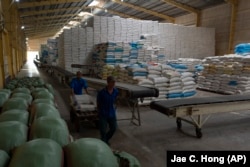Farmers in Vietnam are growing rice using a new method thought to reduce emissions of methane gas and labor costs.
The method is called alternate wetting and drying, or AWD. It uses about 30 percent less water than traditional ways of growing rice. It also uses small flying vehicles called drones to put nutrients in the soil.
Traditional rice farming methods flood fields with water. The water stops oxygen from entering the soil. Low amounts of oxygen permit more methane-producing bacteria to grow.
Scientists say methane can trap 80 times more heat in the atmosphere than carbon dioxide over a short period of time. Climate scientists say releasing methane into the atmosphere increases the warming of the earth. A 2023 United Nations report said rice farming makes up about eight percent of all human-made methane in the atmosphere.
Vietnam is the world’s third-largest rice exporter. Boats carry rice up and down the Mekong River, and the grain is an important food in Vietnam.
Vo Van Van is a 60-year-old rice farmer who lives along the Mekong River. For the past two years, he has been using the AWD method with support from one of Vietnam’s largest rice exporters, the Loc Troi Group.
Van said using the drone to add organic fertilizer saves on labor costs. He says it is becoming harder to find people to work on the rice farms because more people are moving to the cities. The drone also puts the exact amount of fertilizer needed. Too much fertilizer causes the soil to release nitrogen gas. Nitrogen also traps heat in the atmosphere.
After the harvest, Van does not burn the remains of the rice plants. Instead, the Loc Troi Group collects the extra plant material. It then sells it to other companies. These companies can use the remains to feed livestock and grow mushrooms.
Van said the AWD method helps him in several ways. It lowers his costs while the amount of rice he produces is the same. Using organic fertilizer helps him sell for a higher price in European markets. He also has more time to take care of his own garden. “I am growing jackfruit and coconut,” he said.
Nguyen Duy Thuan is the chief of the Loc Troi Group. He said the AWD method uses 40 percent less seed and 30 percent less water. The Loc Troi Group said the method is used on 100 hectares of rice farms. Thuan said the company wants to expand AWD farming to 300,000 hectares.
The Vietnamese government aims to grow low-emissions rice on 1 million hectares by 2030. Vietnamese state media reported that officials said the method could reduce production costs by about 20 percent and increase profits by more than $600 million.
Effects of a changing environment
In recent years, the Mekong River’s water quality has changed. Dams in China and Laos have reduced water flow. Building projects cause problems because they use a lot of water and sand from the river. And rising sea levels have increased the amount of salt in the river’s large delta.
A recent study by Vietnam’s Water Resources Institute estimates rice farmers lost millions of dollars every year because of salty water.
Lewis H. Ziska is a professor of environmental health sciences at Columbia University in New York City. He said that using different methods of farming can improve water use. Growing more kinds of rice would also help. Some kinds can better resist hot weather or need less water, Ziska said.
Some rice farmers in Vietnam are already growing different kinds of rice. Nguyen Van Nhat is director of a rice export company. He said growers are using rice that can grow in salty water and in hot weather.
He also said the export company is using different methods to dry the rice because of changes in the weather. He said unseasonal rains are making it harder to dry the rice in the sun. As a result, the company has built places to dry it in their factory. The company will also put machines to dry the grain closer to the rice fields.
“We don’t know which month is the rainy season, like we did before,” Nhat said.
I’m Andrew Smith. And I’m Jill Robbins.
Aniruddha Ghosal reported this story for the Associated Press. Andrew Smith adapted it for VOA Learning English.
______________________________________________
Words in This Story
emissions –n. gases released by a process
alternate –adj. something that happens for a period and does not happen for the following period, repeating the pattern over time
organic fertilizer –n. nutrients for plants that are considered organic, meaning they do not have man-made materials in them
delta –n. a triangular area where a river flows into the sea and that has rich soil













Forum